91 results
Psychology videos $5-10
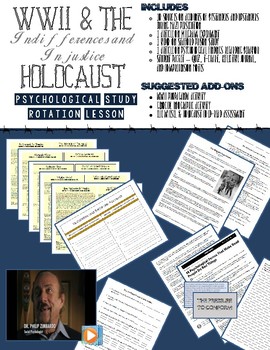
Psychology Study - Indifference, Injustice, and the Holocaust
Psychological Studies Activity – Students delve into reasons why the Holocaust (or any genocide) occurred through a study into psychological studies and theories. This product includes an article on The Milgram Experiments, a video on the Stanford Prison Study, real accounts of Upstanders and Bystanders during Nazi Persecution, and a personal reflective article on other psychological findings that drive positive and negative behavior. Activities for these stations include group discussions, a qu
Grades:
8th - 12th
Types:
Also included in: Four Perfect Pebbles: WWII & Holocaust Complete Bundle + BONUSES GALORE!

AP Psychology Exam Video Review Guide (All Units)
This 145-question packet covers all units on the AP Psych exam. There is an amazing 93-minute review video on YouTube that my students and I discovered a couple of years ago and I have since implemented it as a Spring Break homework assignment for my AP Psych students. I generally give it out a week before Spring Break in case students want to complete it prior to break. He reads from great notes, but they were not made accessible. I decided to create a video guide for my students to use whi
Subjects:
Grades:
9th - 12th, Higher Education
Types:
Also included in: AP Psychology Exam Review Bundle
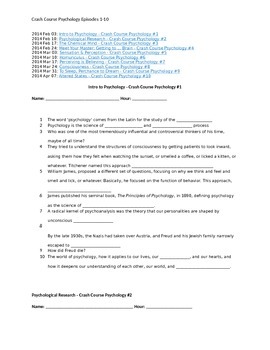
Psychology Crash Course YouTube Episodes 1-10 Video Questions
Video Guides to the YouTube Crash Course Psychology Episodes 1-10
Questions go in order with video. Great for class, extra credit, homebound, test review, ISS, etc...
Episode List
Intro to Psychology - Crash Course Psychology #1
Psychological Research - Crash Course Psychology #2
The Chemical Mind - Crash Course Psychology #3
Meet Your Master: Getting to ... Brain - Crash Psychology #4
Sensation & Perception - Crash Course Psychology #5
Homunculus - Crash Course Psychology #6
Perceiving i
Subjects:
Grades:
7th - 12th
Types:
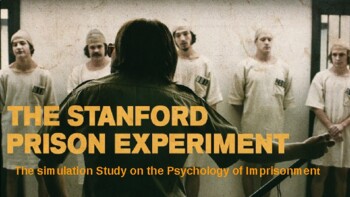
The Stanford Prison Experiment
*** Warning, this slideshow presentation contains sensitive written content, educational videos, and images. It is intended for EDUCATIONAL PURPOSES ONLY for age appropriate high school students**About the presentation...Stanford Prison Experiment, a social psychology study in which college students became prisoners or guards in a simulated prison environment. The experiment, funded by the U.S. Office of Naval Research, took place at Stanford University in August 1971. It was intended to measure
Grades:
9th - 12th, Higher Education, Adult Education

Forensic Files : Bundle Set #8 (10 Science Video Sheets / Distance Learning)
VIDEO AVAILABILITY DISCLAIMER: The videos needed to accompany the Forensic Files worksheets can be found on a variety of streaming services and websites. However, availability and prices for these videos can change month-to-month. Please make sure you have access to both the video and that your school’s servers can stream the content before making your purchase. Forensic Files can be found online easily at: YouTube (also check for “Medical Detectives”) and IMDB. Streaming services like Hulu, Net
Subjects:
Grades:
9th - 12th, Higher Education
Types:

Forensic Files Bundle #28 (10 video worksheet set / science / sub plans)
FORENSIC FILES VIDEO WORKSHEET BUNDLE (10 SHEETS)GRADES: 9-12SUBJECTS: SCIENCE, FORENSICS, LAW, HISTORYSUB/EMERGENCY PLANS: YES!DISTANCE LEARNING: YES!MORE FORENSIC FILES! – CLICK HERE!*Videos are necessary for completion of these worksheets.*Please watch the video in advance of your students to gauge appropriateness.Video Availability: Forensic Files (aka Medical Detectives) videos are available free/pay through a number of streaming and online sites including: YouTube, Amazon, IMDB and more. P
Subjects:
Grades:
9th - 12th
Types:
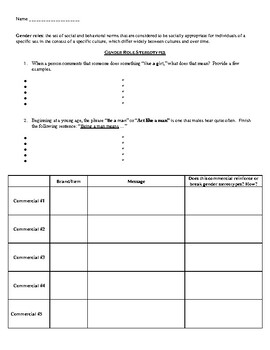
Gender Role Stereotypes Lesson
This lesson deals with gender role stereotypes. In my eighth grade class I teach the ratifying of the 19th Amendment and the liberation of women (ie Flappers) during the Roaring Twenties. I then use these events as a way to introduce the idea of Feminism. This particular lesson has two parts: First it asks students to give examples of what it means to do something "like a girl" and what it means to "be a man" or "act like a man." This is intended to generate interesting discussion about gend
Grades:
8th - 12th
Types:
5:24
3 Types of Phobia & The Famous Case of Button Boy
A phobia is an excessive fear of a seemingly harmless thing. Those affected, go to great lengths to avoid certain situations and if a situation cannot be avoided, they experience severe distress, panic attacks or even fainting. The famous case of Button Boy shows how a single childhood event can create a phobia that is surprisingly complex to treat.
Subjects:
Grades:
Higher Education, Adult Education
5:12
Asch’s Conformity Experiment on Groupthink
In the 1950s the psychologist Solomon Asch devised a study to investigate whether peer pressure can be strong enough to change our perception, and make us believe in things that are not true. To do so, he set up a clever experiment on conformity that raises questions about our ability to think freely.
Subjects:
Grades:
Not Grade Specific
4:57
The Milgram Experiment: Obedience to Authority
Are ordinary people able to do terrible things? And if so, how many would give high electric shocks to an innocent student, just because they are following an order? To find out, Stanley Milgram, a young psychologist at Yale University, conducted a clever, but controversial, experiment that changed our understanding of human behavior forever.
Subjects:
Grades:
Not Grade Specific
3:01
Fluid and Crystallized Intelligence
There are arguably two types of intelligence. Fluid intelligence is your ability to reason quickly. It relies on the ability to hold attention and benefits from a strong working memory. Crystallized intelligence is your ability to apply knowledge from prior learning that was stored in your long term memory. To illustrate how the two work together, we created a short fairytale – a story of a young man, who wants to save a princess that was captured by an evil witch.
Subjects:
Grades:
Not Grade Specific
3:14
Differential Association Theory: The Psychology of Criminal Behavior
When ordinary folks turn into crooks and criminals, it’s sometimes because they learn from the wrong crowds. Edwin Sutherland’s pioneering work in criminology greatly expanded our understanding of how this happens exactly. His theory of "differential association" suggests that there are 9 tenets to learning criminal behavior — and that we learn it almost like we learn anything else.
Subjects:
Grades:
Not Grade Specific
4:53
7 Principles of Psychological Persuasion
The principles of persuasion are a set of psychological rules to influence others. In his book "Influence", Robert Cialdini outlines 6 main principles: Reciprocity, scarcity, authority, consistency, liking and consensus. He later added a 7th principle, unity. Knowing these rules can be helpful to either influence others, or to protect yourself from the techniques when they are being used on you.
Subjects:
Grades:
Not Grade Specific
4:50
The 10 Stages of Genocide
The 10 stages of genocide have been observed and described by Dr Gregory Stanton as a framework to understand how crimes against humanity happen. The framework is supposed to help us spot early warning signs and potentially prevent a human catastrophe.
Subjects:
Grades:
Not Grade Specific
3:24
The 5 Stages of Grief
When losing someone or something that is important to us we often go through 5 stages of grief: denial, anger, bargaining, depression, and acceptance. Each stage serves a purpose to help us come to terms with a loss. This complex emotional response to loss is unique to each person and not always linear.
Subjects:
Grades:
Not Grade Specific
4:53
Borderline Personality Disorder
Borderline Personality Disorder is a mental health condition characterized by a distorted self-image, along with difficulties regulating emotions and maintaining relationships. People with the condition are more at risk for depression and self harm, and it affects around 1-2% of all adults.
Subjects:
Grades:
Not Grade Specific
3:35
Mimetic Theory: Two Types of Psychological Needs
Why do we want the things we want? One psychological explanation is that we often actually don't know what we want, but instead imitate others. This phenomenon is known as mimetic theory. According to Girard, the French philosopher who originated the theory, most of our desires are metaphysical- as opposed to bodily needs - and we mimic them from people around us. And because of that, people inevitably end up wanting the same things, which creates rivalry, conflict, and scapegoating.
Subjects:
Grades:
Not Grade Specific
5:40
ADHD from Childhood to Adulthood
In a group of 100 children, 2 to 4 will have minds that are atypical in a particular way. They have difficulties paying attention, talk too much, or constantly interrupt others. Later they are often diagnosed with Attention Deficit Hyperactivity Disorder, or short ADHD. To learn how it feels like growing up with ADHD, follow Lisa, a young girl who dreams about becoming a writer.
Subjects:
Grades:
Not Grade Specific
3:26
Stereotypes: The Truth Behind Cultural Clichés
Stereotypes are often understood solely as common beliefs about a particular category or group of people, including their personality, appearance, or abilities. However, they also serve as mental shortcuts, helping us generalize, reduce cognitive load, and make decisions quickly.
Subjects:
Grades:
Not Grade Specific
2:25
What The Libet Experiment Tells Us About Free Will
In 1980, Benjamin Libet wanted to find out whether our mind prepared for a movement before we were aware of it. He set up an experiment monitoring brain activity, and found that our brain becomes active 500 milliseconds before we become aware of the decision to make a movement. What does that say about free will?
Subjects:
Grades:
Not Grade Specific
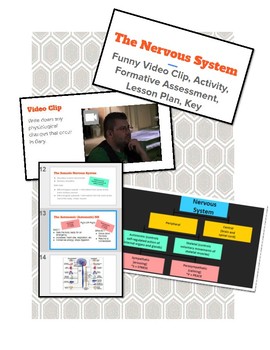
Nervous System & Endocrine System: Funny Vid Clip, Notes, Activity
Lecture can be so dry on the Nervous System and Endocrine System. Make this class stand out with a funny video clip from "Scare Tactics" to kick off class. Students will evaluate the video clip. Next, host a mini lecture with the Google Slides. Finally, students asses their understanding of the Nervous System with "Show me what you know" prompts on a formative assessment built within the slides. Key included. Video embedded. Just open the copied link!
Subjects:
Grades:
9th - 12th
Types:
40:06
(VIDEO LECTURE) A History and Current Practices of Therapy and Treatment
Introducing our comprehensive recording of a lesson on treatment and therapy in abnormal psychology! This engaging and expertly crafted resource provides educators with a valuable tool to enhance classroom instruction. This pairs with the lecture slides and can be used as a teacher resource before a lecture or as an accessibility resource for students.Key Features:In-depth Coverage: Explore various treatment modalities and therapeutic approaches in abnormal psychology, including psychotherapy, p
Subjects:
Grades:
11th - 12th, Higher Education, Staff
Also included in: BUNDLE: A History and Current Practices of Therapy and Treatment
36:21
(VIDEO LECTURE) Abnormal Psychology: Mood Disorders
This is a lecture video that is a focused look into Mood Disorders within Abnormal Psychology based on the slides and information from the Psychology 2E textbook from OpenStax.Key Features:In-depth Coverage: Explore the diagnostic criteria for Mood Disorders and related disorders as well as risk factors, prevalence, and cognitive theories for development.Visual Aids: Enhance learning with visually appealing slides, graphics, and charts that simplify complex theories and methodologies.Classroom R
Subjects:
Grades:
11th - 12th, Higher Education, Adult Education, Staff
Also included in: BUNDLE: Abnormal Psychology: Mood Disorders
18:47
(VIDEO LECTURE) Abnormal Psychology: Anxiety Disorders and Specific Phobias
This introduction to Abnormal Psychology focuses on Anxiety Disorders and Specific Phobias. It is based on the slides and information from the Psychology 2E textbook from OpenStax. It includes 8 slides of information with graphics with notes for the lecturer.Key Features:In-depth Coverage: Explore various anxiety and specific phobia disorders and expand on their history, prevalence, diagnosis, and impact.Real-life Examples: Illustrate concepts with real-world case studies and examples, making th
Subjects:
Grades:
11th - 12th, Higher Education, Adult Education, Staff
Also included in: BUNDLE: Abnormal Psychology: Anxiety Disorders and Specific Phobias
Showing 1-24 of 91 results





